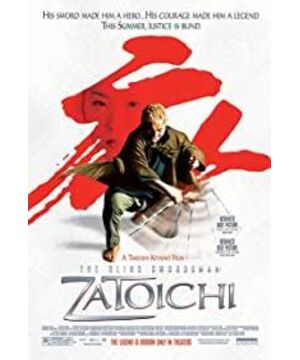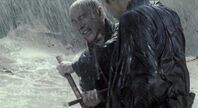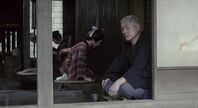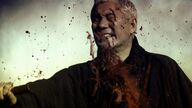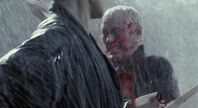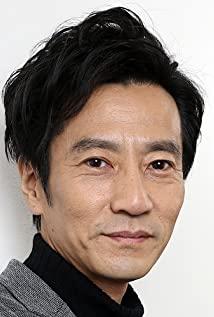"Zatoichi" X#01
figure
- Kitano Takeshi
- Blind (physically unique). The ending reveals that he is playing blind, not really blind (dramatically unique). Derived gambling drama, showing the ultimate hearing.
- Cane Knife (Prop unique). A scene in which the crutches are stolen and killed, and the crutches are knocked off by the real black boss.
- Caring about the fate of the little people (helping the old woman carry vegetables, secretly protecting the old woman's nephew, protecting sisters and brothers).
- Force is unfathomable.
- bodyguard
- Working for a sick wife for a bully.
- an eye for an eye. Cut off the stick the teacher used to beat him to maintain masculinity
- siblings
- The younger brother's disguise as a woman was forced, but to some extent let it go. When the younger brother took a bath with the gambler, he did not shy away from his transgender dress. Instead, he claimed that "you need someone with a good face" to do it. The gender ambiguity of the younger brother is prominent throughout the conservative samurai film. And his determination of self-identity affects the gambler's behavior. The gambler's subsequent drawing of women's clothes in the room will cause laughter, but in fact it shows the exploration of sexual orientation.
- They cheat men out of money indiscriminately, and try to kill men who come to prostitutes without distinction.
- gambler
- Playing a role, putting the character at risk can shape the image of Takeshi Kitano.
- wine house villain duo
- Interesting setting, the boss of the broken tavern is the boss puppet, and the real boss is the old helper of the tavern owner.
- The villain setting enhances the dramatic twist, with the two bosses living in a dilapidated liquor store reminiscent of Mr. Fried Chicken from "Breaking Bad."
- Casino owner and his hired samurai
- The appearance is very cinematic, and the contemptuous tired eyes on the samurai's face, absolutely. Casino boss saggy skin and down mouth.
good show
- The appearance of the boss, push the track on the back and slap the back of the boss's head.
- In the rainy things sad memory play, the Kitano sisters and brothers each recalled their own experiences.
- The elder sister plays the piano, the younger brother dances, and the younger brother's body shape switches between reality and children from time to time.
- At the end of the tap dance, the villain comes on stage, the comedy tone explodes, and the samurai film incorporates tap dance elements, as bantering as Fellini.
make
- The opening of the tavern scene gave the tavern owner a very important compositional position and dwell time, indicating his importance.
- The shots are classic (back and forth, shot up and down), less close-ups, more mediums & panoramas.
- The light of night play is very delicate.
- The film is grainy, the color grading is very classic, and the picture is old. (How to achieve?)
- OST forms some kind of interaction with the ambient sound (knock hammer) (the younger brother is dancing, it is strange that the background music is mixed with the sound of the elder sister's piano).
idle pen
- Scarecrows and peasants in straw hats working and dancing in the fields.
- Nervously fantasized about being the knight's fat man running around the house. (When the house was rebuilt, the fat man was surrounding the structure of the house since he was surrounding it).
- One of the villains took out an abrupt pistol.
- When the bodyguard was defeated and died, his wife also committed suicide in another space, as if some kind of sad fate, reminding people of a certain fate of the terminally ill policeman in "Hana".
View more about The Blind Swordsman: Zatoichi reviews


